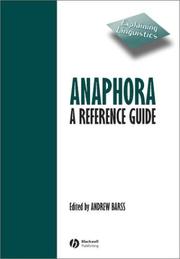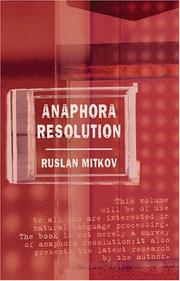| Listing 1 - 3 of 3 |
Sort by
|

ISBN: 0631211187 0631211179 Year: 2002 Publisher: Oxford : Blackwell,
Abstract | Keywords | Export | Availability | Bookmark
 Loading...
Loading...Choose an application
- Reference Manager
- EndNote
- RefWorks (Direct export to RefWorks)
Anafoor (Taalwetenschap) --- Anaphore (Linguistique) --- Anafora (linguïstiek) --- Anaforen (linguïstiek) --- Anafora (linguïstiek). --- Anaforen (linguïstiek). --- 801.56 --- 801.56 Syntaxis. Semantiek --- Syntaxis. Semantiek --- Lexicology. Semantics --- Anaphora (Linguistics). --- Anaphora (Linguistics)

ISBN: 1315840081 131788180X 1317881818 9781317881803 0582325056 9780582325050 9781317881810 9781315840086 9781317881797 9781138146358 1138146358 Year: 2013 Publisher: London ; New York : Routledge,
Abstract | Keywords | Export | Availability | Bookmark
 Loading...
Loading...Choose an application
- Reference Manager
- EndNote
- RefWorks (Direct export to RefWorks)
Teaching computers to solve language problems is one of the major challengesof natural language processing. There is a large amount of interesting researchdevoted to this field. This book fills an existing gap in the literature with anup-to-date survey of the field, including the author's own contributions.A number of different fields overlap in anaphora resolution - computationallinguistics, natural language processing (NLP), grammar, semantics, pragmatics,discourse analysis and artificial intelligence. This book begins by introducingbasic n
Anaphora (Linguistics) --- Cross-reference (Linguistics) --- Grammar, Comparative and general --- Linguistics --- Reference (Linguistics) --- Anafora (linguïstiek). --- Anaforen (linguïstiek). --- Computerlinguïstiek. --- Discoursanalyse. --- Discourse analysis. --- NLP. --- Pragmatiek. --- Semantiek.
Book
ISBN: 1588116212 9027247773 9786612156953 1282156950 9027294674 9789027294678 Year: 2005 Volume: 263 Publisher: Amsterdam ; Philadelphia : J. Benjamins,
Abstract | Keywords | Export | Availability | Bookmark
 Loading...
Loading...Choose an application
- Reference Manager
- EndNote
- RefWorks (Direct export to RefWorks)
Anaphora processing is a central topic in the study of natural language and has long been the object of research in a wide range of disciplines. The correct interpretation of anaphora has also become increasingly important for real-world natural language processing applications, including machine translation, automatic abstracting, information extraction and question answering.This volume provides a unique overview of the processing of anaphora from a multi- and inter-disciplinary angle. It will be of interest and practical use to readers from fields as diverse as theoretical linguistics, corpus linguistics, computational linguistics, computer science, natural language processing, artificial intelligence, human language technology, psycholinguistics, cognitive science and translation studies.The readership includes but is not limited to university lecturers, researchers, postgraduate and senior undergraduate students.
Anaphora (Linguistics) --- Anaforen (linguïstiek) --- Computerlinguïstiek. --- Data processing --- gegevensverwerking. --- psychologische aspecten. --- Anaphore --- Congresses --- Psychological aspects --- Congresses. --- Informatique --- Congrès --- Aspect psychologique --- Lexicology. Semantics --- Psycholinguistics --- Mathematical linguistics --- Gegevensverwerking. --- Psychologische aspecten. --- Cross-reference (Linguistics) --- Grammar, Comparative and general --- Linguistics --- Reference (Linguistics)
| Listing 1 - 3 of 3 |
Sort by
|

 Search
Search Feedback
Feedback About UniCat
About UniCat  Help
Help News
News